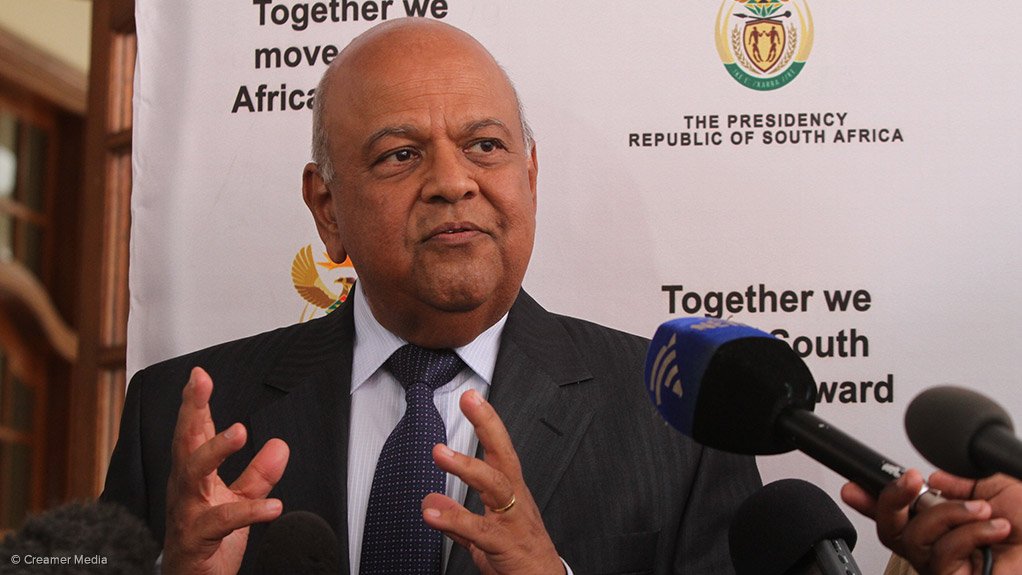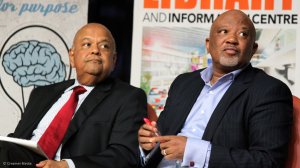Former Finance Minister Pravin Gordhan said on Wednesday that State capture was about “stealing State resources” and that it was a no-go area for him and his former deputy Mcebisi Jonas.
Gordhan and Jonas both addressed a seminar organised by the University of Johannesburg, on State capture, white monopoly capital and radical transformation.
Discussing the political catch phrases of the moment they shared the platform with economist Lumkile Mondi.
Gordhan praised Jonas for refusing to take a R600-million bribe from business family the Gupta’s in exchange for the Minister of Finance position.
Who would have made such an appointment went without saying.
“He was not prepared to sell-out the sovereignty of our country to anybody. Each of us today has to confront which side we are on. Resources stolen could make a huge difference in houses and health in our country. This kind of stealing impacts on every single citizen and it deprives young people of jobs,” said Gordhan.
Highlighting the serious decline in the economy, which is in its first recession since 2009, Gordhan said negative growth had resulted in lower revenue, which had affected the country and was stalling investments. He said money for public services under such conditions would become increasingly difficult to come by.
Venturing to address what radical transformation meant Gordhan said: “There is no doubt that the South African economy needs to be restructured, diverse and competitive to compete with the rest of the world.”
While the term clearly left much open to interpretation, which has been apparent in the debates leading up to and following the ANC policy conference in June, and now in the lead-up to the December elective conference, Gordhan made it clear that despite this there was now a right and wrong side, pleading with his fellow comrades who were on the fence to come out and stand up for what was right.
“Now is the time to make a decision on where you stand.”
‘STATE CAPTURE CANDIDATES’
Jonas was as forthright, saying South Africa was facing its defining moment both politically and economically.
“South Africa is experiencing weak growth. It’s a real challenge that we have to deal with. Our country is becoming a capital of State capture. State owned entities (SOEs) are becoming the centers for money racketeering if nothing else. What we lose is what is forfeited by education, health and all other basic services,” stressed Jonas.
He said a robust system of accountability was needed to drive the switch to economic growth and the pursuit of equality, adding that slogans did not solve problems anywhere in the world.
Jonas concluded by saying that “State capture candidates” did not apply zero tolerance on corruption and led underperformance that compared unfavourably with performance-focused countries such as Turkey and Singapore.
“We must accept that we don’t have that in South Africa given the reality of our politics. Our country is in a crisis of leadership. We require stronger leadership not the leaders who 80% of the time defend its problems,” he stated.
Jonas concluded by calling on civil society, labour movements and government to begin to engage.
ACADEMIC SUPPORT
Fellow discussant Mondi and other academics have released a report, influenced by former Public Protector Thuli Madonsela’s ‘State of Capture’ report, highlighting how the State is being looted.
Mondi said the group was keen on defending the values instilled by former Statesman Nelson Mandela.
Mondi said the level at which the State had been looted was evident in Finance Minister Malusi Gigaba using his previous position as Minister of Public Enterprises to change boards at SOEs, and when as Minister of Home Affairs he issued citizenship to the Gupta family in an effort to influence State resource allocation.
“What we argue is that the State has been repurposed. This is a real silent coup. As academics we say State capture is not fiction. Gupta leaks is not a story. We need to understand how these matters arose,” said Mondi.
South Africa needed radical transformation, he said and added that if there was no change as to who controlled the State nothing would change.
Mondi says recent developments had shown how desperate the shadow State can be, referencing the latest iteration of the Mining Charter.
“For us as South Africans and academics we need to understand that a silent coup is taking place. The State has been purposed for a few.”
He concluded by quoting Nelson Mandela, saying “it is in our hands”.
EMAIL THIS ARTICLE SAVE THIS ARTICLE ARTICLE ENQUIRY
To subscribe email subscriptions@creamermedia.co.za or click here
To advertise email advertising@creamermedia.co.za or click here












